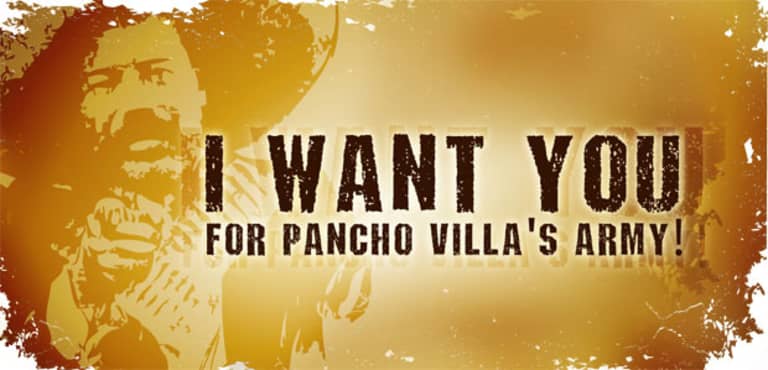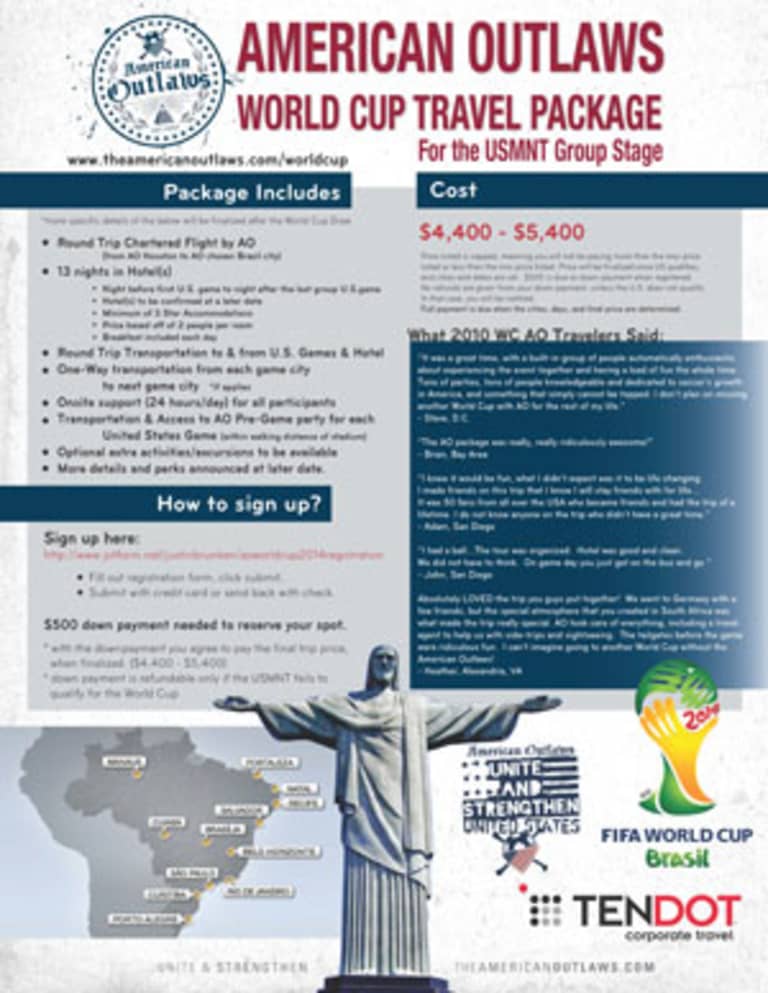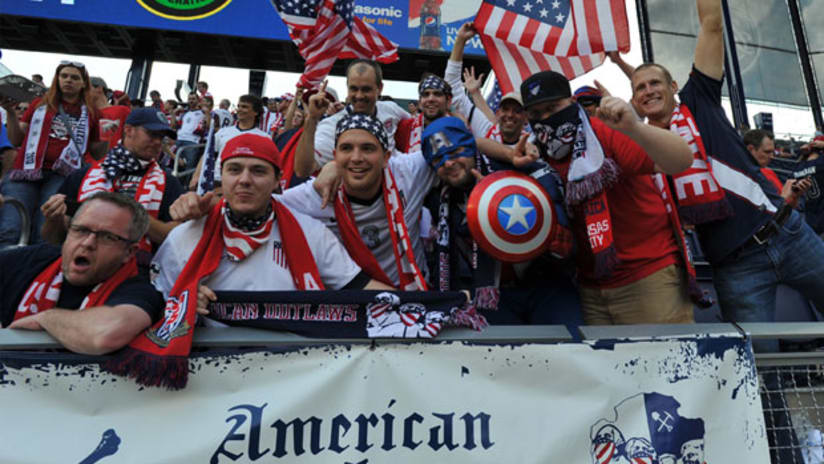The on-field soccer rivalry between the United States and Mexico could soon take a unique turn into the courts in Texas, if a brewing legal battle between the leading US-based supporters groups is carried that far.
Lawyers for Pancho Villa’s Army, a US-based supporters group for the Mexican national team, filed suit in Travis County (Tex.) court on Tuesday against their US national team counterparts, the American Outlaws, insisting that the group interfered with plans to attend the World Cup in Brazil next summer because of racial motivations.
The suit alleges that a member of the American Outlaws’ leadership threatened to cut ties with a Nebraska-based travel agency if the company continued to work with Pancho Villa’s Army.
Both the American Outlaws and the travel agency – TenDot Corporate Travel – deny having done anything illegal.
TenDot is being sued for breach of contract and negligent representation for terminating an agreement with Pancho Villa’s Army (PVA) in August, while the American Outlaws are accused of tortious interference for allegedly influencing the termination of the contract.
Pancho Villa’s Army is seeking between $200,000 and $1 million in damages, including lawyers’ fees. When legal action was originally initiated in September, they asked for a sum of $318,000 to release all claims.
Under Texas state law, if found liable in the courts, both TenDot and the American Outlaws would be held equally responsible financially.
It is unclear, however, whether Pancho Villa’s Army has a viable case or whether the suit will end up at trial.
In court papers acquired by MLSsoccer.com, the lawyers for Pancho Villa’s Army state that the group entered into an agreement earlier this summer with TenDot to sell travel packages to the World Cup at $5,000 per package, in exchange for a commission of $500 per package sale. Although no specific date of the contract is included in the papers, the lawyer for PVA, Warren Wills, told MLSsoccer.com the agreement was made on or around July 26.
The suit alleges, however, that the contract was abruptly terminated by TenDot one month later, on August 26. According to the suit, no reason was initially given for the change, and only after several attempts were made by a PVA representative to find out why the contract was terminated did TenDot respond to the request.
According to the suit, TenDot executive vice president Derrick A. Eells informed PVA that a representative from the American Outlaws “did not want TenDot working with a group like Pancho Villa that supports the Mexican National Football Team.”
These actions, according to the suit, “were not only illegal; they appear to be motivated by race.”
In an e-mail obtained by MLSsoccer.com dated Sept. 26 from Wills to Eells and American Outlaws president Korey Donahoo, Wills alleges that “what TenDot and the American Outlaws are doing is wrong on so many levels it is hard to keep count. Your apparent racist actions must and will be stopped.”
*

*
Founded in 2007 in Lincoln, Neb., the American Outlaws are the nation’s largest supporters group for the US national team, reportedly logging more than 15,000 members in 100 chapters in the United States. They are a constant presence at US games on domestic soil and abroad, most recently during the US team’s 2-0 win over Jamaica in Kansas City on Oct. 11 and last month in Columbus, when the Outlaws were credited with selling more than 9,000 tickets for the US’ 2-0 win over Mexico at a raucous Crew Stadium.
Pancho Villa’s Army was founded in Austin in 2012 (the image above is taken from their website). It currently comprises eight chapters and claims to be the only US-based supporters group for the Mexican national team. According to Wills's September e-mail, Pancho Villa’s Army has 7,000 followers, all of whom were eligible to buy the World Cup packages from TenDot.
The legal representative for the American Outlaws, Andre R. Barry, denied PVA’s accusations in an e-mail dated Oct. 8 sent to Wills.
Barry did confirm that the American Outlaws contacted TenDot regarding its relationship with PVA. According to Barry’s e-mail, when the American Outlaws — who in 2011 began offering an exclusive World Cup travel package via TenDot — heard that PVA was offering a nearly identical travel package through TenDot, they contacted TenDot to see if it was true.
To the American Outlaws, the World Cup travel package deal (pictured at right) seemed to follow a pattern of behavior by PVA, and they wanted to confirm if this was another instance.

“Over the years, PVA has apparently copied many aspects of American Outlaws’ business model, American Outlaws’ website and American Oultaws’ materials,” Barry’s e-mail states. “PVA’s travel package was nearly identical to the offer American Outlaws had worked out with TenDot over a period of several months. Even the application was the same.”
In fact, PVA did choose to contract with TenDot, Wills told MLSsoccer.com, “because of TenDot’s history of working with American Outlaws. They know how to handle these package deals, and they’re experienced with the American Outlaws, amongst these other soccer groups.”
It’s unclear why the American Outlaws were upset about PVA using TenDot as their travel agency, or the motivations for TenDot to terminate the relationship with PVA. Barry declined to comment when asked specific questions about these details, and TenDot representatives did not respond to numerous requests for comment by MLSsoccer.com for any aspect of this article.
Barry’s e-mail to Wills does state, however, that the American Outlaws never asked that TenDot terminate its contract with PVA.
“American Outlaws did not demand or even ask that TenDot cancel whatever arrangements it may have had with PVA,” the e-mail states.
WATCH: Are there any questions left after the Hex is over?
The e-mail also addresses the charge of racism in the suit, stating, “there is no truth whatsoever to PVA’s allegations that American Outlaws’ conduct was in any way motivated by race,” citing the American Outlaws’ Code of Conduct forbidding discrimination.
The legal team representing TenDot, meanwhile, sent a letter to Wills dated Oct. 8, insisting that the company “hasn’t breached any contract and certainly hasn’t in any way engaged in any racially discriminatory conduct.”
The American Outlaws responded to the charges via a statement on their web site on Friday.
"American Outlaws did not demand or even ask that TenDot cancel whatever arrangements it may have had with PVA," the statement reads. "More importantly, American Outlaws was not motivated by race in its communications with TenDot ... AO's Code of Conduct forbids discrimination. There is no factual or legal basis for the claims threatened by PVA."
*
At this time, it’s still uncertain whether the case will ever go to trial. It could settle out of court, but the American Outlaws and TenDot declined that option when the suit was first proposed late last month and appear equally reluctant to do so now.
It’s notable that PVA did not sell any travel packages to its members during the month-long relationship with TenDot, perhaps because Mexico have yet to qualify for the World Cup. Even so, PVA feels entitled to recover damages because of packages it claims it could have sold had the contract not been terminated.
“We have them dead to rights on liability, so the only question is how much money they have to pay us,” Wills told MLSsoccer.com. “[TenDot] breached the contract, and [American Outlaws] interfered with it, no question. The only thing a jury is going to have to decide is how much money they’re going to have to pay us.”
If the suit does go to trial it is expected to begin early next year.













